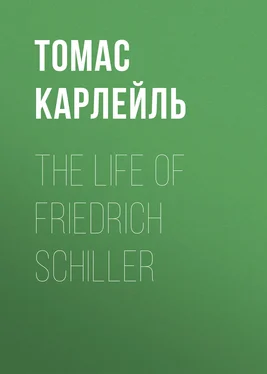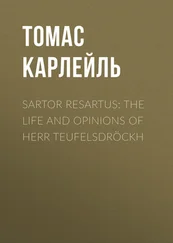Томас Карлейль - The Life of Friedrich Schiller
Здесь есть возможность читать онлайн «Томас Карлейль - The Life of Friedrich Schiller» — ознакомительный отрывок электронной книги совершенно бесплатно, а после прочтения отрывка купить полную версию. В некоторых случаях можно слушать аудио, скачать через торрент в формате fb2 и присутствует краткое содержание. Жанр: Биографии и Мемуары, Философия, foreign_edu, foreign_antique, на английском языке. Описание произведения, (предисловие) а так же отзывы посетителей доступны на портале библиотеки ЛибКат.
- Название:The Life of Friedrich Schiller
- Автор:
- Жанр:
- Год:неизвестен
- ISBN:нет данных
- Рейтинг книги:3 / 5. Голосов: 1
-
Избранное:Добавить в избранное
- Отзывы:
-
Ваша оценка:
- 60
- 1
- 2
- 3
- 4
- 5
The Life of Friedrich Schiller: краткое содержание, описание и аннотация
Предлагаем к чтению аннотацию, описание, краткое содержание или предисловие (зависит от того, что написал сам автор книги «The Life of Friedrich Schiller»). Если вы не нашли необходимую информацию о книге — напишите в комментариях, мы постараемся отыскать её.
The Life of Friedrich Schiller — читать онлайн ознакомительный отрывок
Ниже представлен текст книги, разбитый по страницам. Система сохранения места последней прочитанной страницы, позволяет с удобством читать онлайн бесплатно книгу «The Life of Friedrich Schiller», без необходимости каждый раз заново искать на чём Вы остановились. Поставьте закладку, и сможете в любой момент перейти на страницу, на которой закончили чтение.
Интервал:
Закладка:
Schiller's Carlos is the first of his plays that bears the stamp of anything like full maturity. The opportunities he had enjoyed for extending his knowledge of men and things, the sedulous practice of the art of composition, the study of purer models, had not been without their full effect. Increase of years had done something for him; diligence had done much more. The ebullience of youth is now chastened into the steadfast energy of manhood; the wild enthusiast, that spurned at the errors of the world, has now become the enlightened moralist, that laments their necessity, or endeavours to find out their remedy. A corresponding alteration is visible in the external form of the work, in its plot and diction. The plot is contrived with great ingenuity, embodying the result of much study, both dramatic and historical. The language is blank verse, not prose, as in the former works; it is more careful and regular, less ambitious in its object, but more certain of attaining it. Schiller's mind had now reached its full stature: he felt and thought more justly; he could better express what he felt and thought.
The merit we noticed in Fiesco , the fidelity with which the scene of action is brought before us, is observable to a still greater degree in Don Carlos . The Spanish court in the end of the sixteenth century; its rigid, cold formalities; its cruel, bigoted, but proud-spirited grandees; its inquisitors and priests; and Philip, its head, the epitome at once of its good and its bad qualities, in all his complex interests, are exhibited with wonderful distinctness and address. Nor is it at the surface or the outward movements alone that we look; we are taught the mechanism of their characters, as well as shown it in action. The stony-hearted Despot himself must have been an object of peculiar study to the author. Narrow in his understanding, dead in his affections, from his birth the lord of Europe, Philip has existed all his days above men, not among them. Locked up within himself, a stranger to every generous and kindly emotion, his gloomy spirit has had no employment but to strengthen or increase its own elevation, no pleasure but to gratify its own self-will. Superstition, harmonising with these native tendencies, has added to their force, but scarcely to their hatefulness: it lends them a sort of sacredness in his own eyes, and even a sort of horrid dignity in ours. Philip is not without a certain greatness, the greatness of unlimited external power, and of a will relentless in its dictates, guided by principles, false, but consistent and unalterable. The scene of his existence is haggard, stern and desolate; but it is all his own, and he seems fitted for it. We hate him and fear him; but the poet has taken care to secure him from contempt.
The contrast both of his father's fortune and character are those of Carlos. Few situations of a more affecting kind can be imagined, than the situation of this young, generous and ill-fated prince. From boyhood his heart had been bent on mighty things; he had looked upon the royal grandeur that awaited his maturer years, only as the means of realising those projects for the good of men, which his beneficent soul was ever busied with. His father's dispositions, and the temper of the court, which admitted no development of such ideas, had given the charm of concealment to his feelings; his life had been in prospect; and we are the more attached to him, that deserving to be glorious and happy, he had but expected to be either. Bright days, however, seemed approaching; shut out from the communion of the Albas and Domingos, among whom he lived a stranger, the communion of another and far dearer object was to be granted him; Elizabeth's love seemed to make him independent even of the future, which it painted with still richer hues. But in a moment she is taken from him by the most terrible of all visitations; his bride becomes his mother; and the stroke that deprives him of her, while it ruins him forever, is more deadly, because it cannot be complained of without sacrilege, and cannot be altered by the power of Fate itself. Carlos, as the poet represents him, calls forth our tenderest sympathies. His soul seems once to have been rich and glorious, like the garden of Eden; but the desert-wind has passed over it, and smitten it with perpetual blight. Despair has overshadowed all the fair visions of his youth; or if he hopes, it is but the gleam of delirium, which something sterner than even duty extinguishes in the cold darkness of death. His energy survives but to vent itself in wild gusts of reckless passion, or aimless indignation. There is a touching poignancy in his expression of the bitter melancholy that oppresses him, in the fixedness of misery with which he looks upon the faded dreams of former years, or the fierce ebullitions and dreary pauses of resolution, which now prompts him to retrieve what he has lost, now withers into powerlessness, as nature and reason tell him that it cannot, must not be retrieved.
Elizabeth, no less moving and attractive, is also depicted with masterly skill. If she returns the passion of her amiable and once betrothed lover, we but guess at the fact; for so horrible a thought has never once been whispered to her own gentle and spotless mind. Yet her heart bleeds for Carlos; and we see that did not the most sacred feelings of humanity forbid her, there is no sacrifice she would not make to restore his peace of mind. By her soothing influence she strives to calm the agony of his spirit; by her mild winning eloquence she would persuade him that for Don Carlos other objects must remain, when his hopes of personal felicity have been cut off; she would change his love for her into love for the millions of human beings whose destiny depends on his. A meek vestal, yet with the prudence of a queen, and the courage of a matron, with every graceful and generous quality of womanhood harmoniously blended in her nature, she lives in a scene that is foreign to her; the happiness she should have had is beside her, the misery she must endure is around her; yet she utters no regret, gives way to no complaint, but seeks to draw from duty itself a compensation for the cureless evil which duty has inflicted. Many tragic queens are more imposing and majestic than this Elizabeth of Schiller; but there is none who rules over us with a sway so soft and feminine, none whom we feel so much disposed to love as well as reverence.
The virtues of Elizabeth are heightened by comparison with the principles and actions of her attendant, the Princess Eboli. The character of Eboli is full of pomp and profession; magnanimity and devotedness are on her tongue, some shadow of them even floats in her imagination; but they are not rooted in her heart; pride, selfishness, unlawful passion are the only inmates there. Her lofty boastings of generosity are soon forgotten when the success of her attachment to Carlos becomes hopeless; the fervour of a selfish love once extinguished in her bosom, she regards the object of it with none but vulgar feelings. Virtue no longer according with interest, she ceases to be virtuous; from a rejected mistress the transition to a jealous spy is with her natural and easy. Yet we do not hate the Princess: there is a seductive warmth and grace about her character, which makes us lament her vices rather than condemn them. The poet has drawn her at once false and fair.
In delineating Eboli and Philip, Schiller seems as if struggling against the current of his nature; our feelings towards them are hardly so severe as he intended; their words and deeds, at least those of the latter, are wicked and repulsive enough; but we still have a kind of latent persuasion that they meant better than they spoke or acted. With the Marquis of Posa, he had a more genial task. This Posa, we can easily perceive, is the representative of Schiller himself. The ardent love of men, which forms his ruling passion, was likewise the constant feeling of his author; the glowing eloquence with which he advocates the cause of truth, and justice, and humanity, was such as Schiller too would have employed in similar circumstances. In some respects, Posa is the chief character of the piece; there is a preëminent magnificence in his object, and in the faculties and feelings with which he follows it. Of a splendid intellect, and a daring devoted heart, his powers are all combined upon a single purpose. Even his friendship for Carlos, grounded on the likeness of their minds, and faithful as it is, yet seems to merge in this paramount emotion, zeal for the universal interests of man. Aiming, with all his force of thought and action, to advance the happiness and best rights of his fellow-creatures; pursuing this noble aim with the skill and dignity which it deserves, his mind is at once unwearied, earnest and serene. He is another Carlos, but somewhat older, more experienced, and never crossed in hopeless love. There is a calm strength in Posa, which no accident of fortune can shake. Whether cheering the forlorn Carlos into new activity; whether lifting up his voice in the ear of tyrants and inquisitors, or taking leave of life amid his vast unexecuted schemes, there is the same sedate magnanimity, the same fearless composure: when the fatal bullet strikes him, he dies with the concerns of others, not his own, upon his lips. He is a reformer, the perfection of reformers; not a revolutionist, but a prudent though determined improver. His enthusiasm does not burst forth in violence, but in manly and enlightened energy; his eloquence is not more moving to the heart than his lofty philosophy is convincing to the head. There is a majestic vastness of thought in his precepts, which recommends them to the mind independently of the beauty of their dress. Few passages of poetry are more spirit-stirring than his last message to Carlos, through the Queen. The certainty of death seems to surround his spirit with a kind of martyr glory; he is kindled into transport, and speaks with a commanding power. The pathetic wisdom of the line, 'Tell him, that when he is a man, he must reverence the dreams of his youth,' has often been admired: that scene has many such.
Читать дальшеИнтервал:
Закладка:
Похожие книги на «The Life of Friedrich Schiller»
Представляем Вашему вниманию похожие книги на «The Life of Friedrich Schiller» списком для выбора. Мы отобрали схожую по названию и смыслу литературу в надежде предоставить читателям больше вариантов отыскать новые, интересные, ещё непрочитанные произведения.
Обсуждение, отзывы о книге «The Life of Friedrich Schiller» и просто собственные мнения читателей. Оставьте ваши комментарии, напишите, что Вы думаете о произведении, его смысле или главных героях. Укажите что конкретно понравилось, а что нет, и почему Вы так считаете.












